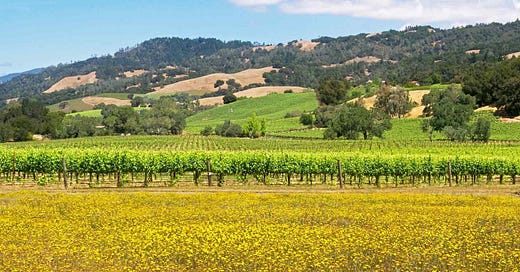Often overshadowed by Napa, Sonoma County has steadily built its own identity in Cabernet Sauvignon. Stretching from the Alexander and Knights Valleys in the north to cooler pockets near the coast, Sonoma offers diverse microclimates, varied soils, and a winemaking ethos that merges tradition with a laid-back spirit. Whether you’re tasting bright, medium-bodied reds from chalky benchlands or denser, oak-driven versions from warm inland pockets, Sonoma’s Cabernet scene proves this county is far more than Pinot and Chardonnay territory.
Defining Traits
Coastal Influence
Marine fog and cool evening breezes help Cab maintain acidity and a certain freshness, even as daytime warmth fosters bold fruit flavors.Varied Terrain
The northern reaches (Alexander Valley, Knights Valley) see more heat and produce plush, fruit-forward wines. Meanwhile, benchland soils near the foothills can yield firmer tannins and darker fruit.Chilled-Out Culture
Sonoma’s relaxed vibe and family-run wineries encourage experimentation, whether in oak regimens, clonal selections, or biodynamic vineyard practices.Counterpoint to Napa
Sonoma Cabs often retain a balance of power and lift, showing slightly brighter fruit and a softer, more casual side than their Napa cousins.
Upgrade to Daily Terroir’s premium subscription to access all our content for less than 3 dollars a month.
Premium Subscriber Content
Terroir and Winemaking Deep Dive
Northern Sub-AVAs and Benchlands
Alexander Valley
Warm valley floor fosters plush, fruit-forward wines (think blackberry jam, chocolate) with round tannins.
Terraced vineyards on the eastern slopes can yield more structured, mineral-driven Cabernets.
Keep reading with a 7-day free trial
Subscribe to Daily Terroir: Exploring Wine Regions One Day at a Time to keep reading this post and get 7 days of free access to the full post archives.





